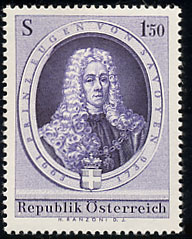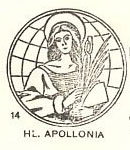|
Autriche |
| Emission : 18 octobre 1963 | N° Y. & T. : n° 972 |
|
|
Thème :
Tricentenaire de la naissance du prince Eugène de Savoie ( 1663 - 1736 ) qui fut un homme de guerre au service de l'Autriche . Placé à la tête des troupes impériales au début de la guerre de la Succession d'Espagne, il vainquit l'armée de Louis XIV à Malplaquet (1709), mais fut battu à Denain par Villars (1712). En 1717, il enleva Belgrade aux Turcs.
Prince Eugene of Savoy, one of the most striking personalities in the history of Austria, was born in Paris on October 18, 1663. Originally designated for the priesthood, in February, 1683, at the age of 20, he gave up the cloth and asked King Louis XIV for permission to join the army - only to be turned down. Destined to become Louis XIV's biggest opponent on the battlefield, Prince Eugene left Paris and joined the Austrian army. He played a decisive role in the freeing of Vienna. And he was one of the most important defenders of the West against the Turks and the protector of the European balance of power against the French. In 1697 he defeated the Turkish Army at the crossing over the Tisa River near Zenta. And in 1699 the peace agreement increased thesize of Austria by one third, lifting it to world-wide importance. After the war against the French, not only did he achieve great acclaim and success as commander, but he also played an important role in the Treaty of Radstatt which ended the conflict.In 1703 he was named the President of the Imperial War Council. In his last years, he once again proved his abilities on the battlefields near the Rhine and Mosel rivers against the French and Spanish. He died after a short bout with illness on April 24, 1736.
Commentaires :
Ces 2 enveloppes montrent une flamme représentant la sainte Apolline,sainte catholique romaine.
Le martyr de la sainte est décrit dans une lettre écrite en ± 249 d'Alexandrie
par St Dyonisos. Il décrit une 'vierge âgée', Apollonia, qui a été arrêtée
et eu les dents brisées car elle refusait d'abandonner le christianisme.
Elle fut canonisée environ 50 ans après sa mort, et durant les croisades,
elle fut considérée comme la patronne de la douleur associée aux dents.
![]()
Le cachet est celui du Congrès Dentaire Autrichien de 1963, qui s'est tenu à Vienne du 17 au 20 octobre..
FDC
|
|
|
|
|
Le cachet avec le dessin de Sainte Apolline |
Informations techniques :
| Taille : | .. x .. mm | Dessinateur : | |
| Dentelure : | 13 | Couleur : | violet |
| Valeur(s) : | 1,5 s. | N° Scott : | |
| Autres pays : | |||




